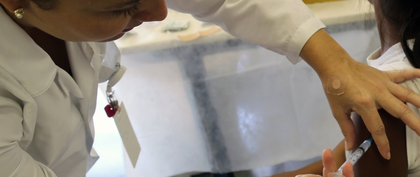US CDC does a U-turn on autism-vaccine link, doctors reject claims
By IANS | Updated: November 21, 2025 13:45 IST2025-11-21T13:44:45+5:302025-11-21T13:45:19+5:30
New Delhi, Nov 21 The US Centers for Disease Control and Prevention (US CDC), the national public health ...

US CDC does a U-turn on autism-vaccine link, doctors reject claims
New Delhi, Nov 21 The US Centers for Disease Control and Prevention (US CDC), the national public health agency of America, has quietly taken up an anti-vaccine stand, hinting at the association between vaccines and autism. However, experts on Friday thwarted the claims.
Once a key opponent of growing global anti-vaccine sentiment, the change in CDC reflects an anti-vaccine stance by Health and Human Services Secretary Robert F. Kennedy Jr., which is also endorsed by President Donald Trump.
“The claim ‘vaccines do not cause autism’ is not an evidence-based claim because studies have not ruled out the possibility that infant vaccines cause autism,” read the US CDC website.
The updated page also says studies supporting a link “have been ignored by health authorities” and mentions that HHS is doing a “comprehensive assessment of the causes of autism.”
However, the old webpage had stated: “No links have been found between any vaccine ingredients and ASD”.
Dr. Rajeev Jayadevan of the Indian Medical Association, Kochi, told IANS that the scientific evidence is clear that vaccines do not raise the risk of autism.
He cited a large Danish study following more than 650,000 children, which found no link between the MMR vaccine and autism.
“The adjusted hazard ratio was 0.93, with a 95 per cent confidence interval of 0.85-1.02, basically showing that vaccinated and unvaccinated children had identical autism rates -- even in high-risk groups,” the expert noted.
He explained that the anti-vaccine movement first began with a fraudulent paper published in The Lancet by Dr Andrew Wakefield in 1998, which falsely claimed a link between vaccines and autism.
While the paper was later exposed as fraudulent and fully retracted, “the myth had already taken hold. And once a belief settles into public consciousness, disproving it becomes extraordinarily difficult,” Jayadevan said.
“Despite lack of scientific evidence, several people around the world continue to believe that vaccines cause autism, including some in positions of responsibility,” he added.
Dr Shefali Gulati, paediatric neurologist at AIIMS, reaffirmed that vaccines do not raise the risk of autism or other diseases.
“Extensive global research consistently shows no causal link between vaccines -- including MMR or thimerosal-containing vaccines -- and autism. While a few isolated studies have reported weak associations, none have demonstrated any causal relationship, and the highest-quality evidence overwhelmingly refutes a connection,” Gulati told IANS.
“Despite evidence, the persistence of the debunked vaccine-autism myth continues to drive hesitancy and contributes to the resurgence of preventable diseases such as measles,” the neurologist said.
She also raised concerns that repeatedly settling such debates diverts vital resources from strengthening immunisation programmes and supporting early developmental interventions.
Disclaimer: This post has been auto-published from an agency feed without any modifications to the text and has not been reviewed by an editor
Open in app